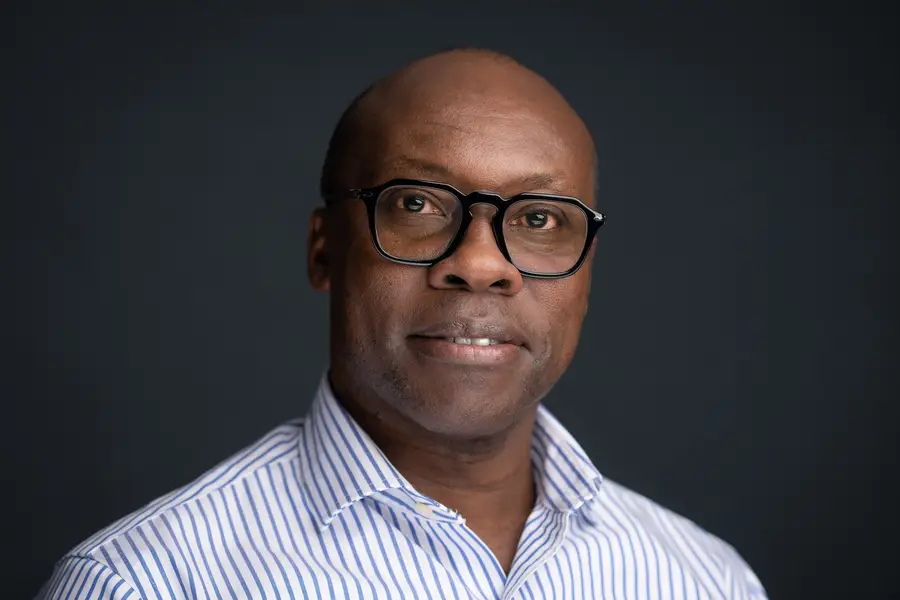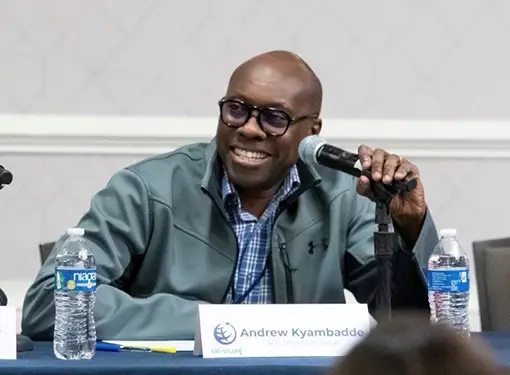Supporting Health Systems to End Neglected Tropical Diseases
Andrew Kyambadde is passionate about strengthening health systems to ensure health for all.
Andrew Kyambadde is passionate about strengthening health systems to ensure health for all.

Neglected tropical diseases (NTDs) are a major health concern for many people living in tropical and subtropical, low-income regions worldwide. NTDs are a group of infectious diseases that primarily affect those who do not have access to health, education, clean water, or sanitation services. These diseases often cause extreme pain, disability, and even social exclusion. Despite over a billion people globally suffering from NTDs, little attention has historically been drawn to treatment and prevention. NTDs have earned their name “neglected” for this very reason.
Andrew Kyambadde, a health systems strengthening lead at RTI, knows the complexities of integrating services into communities to prevent and treat disease. After spending more than 20 years leading the health systems strengthening team efforts at the USAID Mission in Uganda, he is bringing his expertise to the delivery of NTD services. Kyambadde currently serves on USAID’s Act to End Neglected Tropical Diseases (NTDs) | East Program implemented by RTI. The program seeks to eliminate neglected tropical diseases, such as trachoma, onchocerciasis, and lymphatic filariasis, in Bangladesh, Ethiopia, Haiti, Indonesia, Lao PDR, Mozambique, Nepal, Nigeria, Philippines, Tanzania, Uganda, and Viet Nam. Kyambadde’s work is motivated by the hope of ending neglected tropical diseases within his lifetime.
“We are working on a set of diseases that can be eliminated in our lifetime,” he said. “Aren’t we lucky? Many people have worked on diseases and passed away, passing the baton to another generation to hopefully solve.” Already, more than 54 countries globally have eliminated at least one NTD, proof that this goal is possible.
Early in his career, Kyambadde did not anticipate his job at a brewery would lead to a career in health systems strengthening. After graduating from Makerere University with a bachelor’s degree in social science, Kyambadde joined the marketing division for Uganda Breweries Limited, the biggest local brewery company in Uganda at the time. There he gained the necessary skills in marketing to distribute company products. When a USAID-funded program contracted to implement a social marketing component in an integrated reproductive health program in Uganda needed a social marketing expert, Kyambadde joined the team. Three years later, he went back to school, earning his MSC Econ in Health Planning and Development at the University of Wales in the United Kingdom.
Kyambadde returned to Uganda and joined USAID/Uganda again as a program management specialist with a focus on HIV/AIDS. He participated in the design and implementation and oversaw projects and public-private-partnerships programs. Over time, care and medical treatment was available for HIV, but there was little to no support for systems to implement and sustain these programs. The program needed partnerships with local governments and processes that would support current and future patients.
In 2014, the USAID HIV team split into two groups: services/care and health systems. Kyambadde was a part of the original systems team. The health systems team included supply chain management, human resources for health, leadership governance, and accountability, health financing, community systems, all critical components of a resilient health system.
“When we talk about systems, it is the tangible things that you can’t touch but are extremely important to moving the whole machinery in the right direction,” Kyambadde stated. “For me, there was a big challenge in convincing the rest of the team that it’s important to put as many people as we can on treatment, but also build the systems along the way to ensure that they stay on treatment and ensure that there is an opening to bring in more people within the existing local system.”
Although integration of health systems into HIV programming had its challenges, Kyambadde is particularly proud of the program’s success. In 2018, Kyambadde was the first Ugandan to chair the health development partners, a forum that brings together all the Uganda health development partners that work closely with the host government officials. The health partners focus on aligning their priorities to those of the host government.
In 2022, Kyambadde moved to the U.S. under the State Department special immigrant visa program. On arrival, he saw an opportunity to use his knowledge and skills learned from implementing health systems in Africa to support health system programming for ending NTDs. He moved, along with his family, from Uganda to Washington, D.C., where he joined RTI. After years working directly for USAID/Uganda, Kyambadde has a new perspective working as a USAID partner.
Kyambadde was drawn to NTD work because many of the diseases face the same problems that health programs experienced over the last several decades. Through USAID's Act to End NTDs | East program, Kyambadde is supporting governments in Africa and Asia as they work to develop sustainability plans and address key challenges in policy, planning, and financing for NTD services.

Kyambadde explained the steps taken to break down barriers towards elimination of NTDs. In many countries, donors and entities have been working outside the national health system. This has created a problem of implementing parallel programs outside the national systems. “I’m proud to be a part of a team that has helped streamline entities within existing systems at both national and sub national levels. It’s baby steps for now, but I trust we’re moving in the right direction,” he said. Kyambadde emphasized that small steps to integrating government and health information systems will create a drastic change in successful NTD treatment and prevention programs.
“One thing that has excited me is that for the first time, I’m working on a condition or diseases that can be eliminated in our lifetime,” he said. “It gives me the motivation to wake up every morning and go to work.”